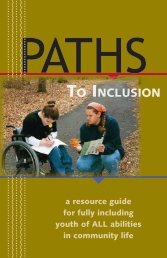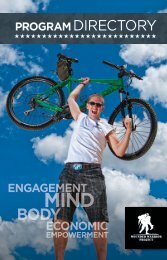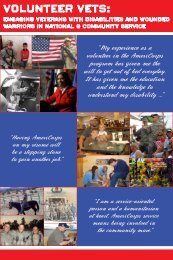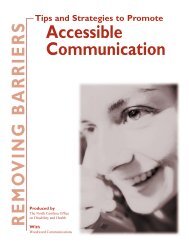Active Citizens 101 - National Service Inclusion Project
Active Citizens 101 - National Service Inclusion Project
Active Citizens 101 - National Service Inclusion Project
You also want an ePaper? Increase the reach of your titles
YUMPU automatically turns print PDFs into web optimized ePapers that Google loves.
Introduction<br />
RATIONALE<br />
The <strong>National</strong> and Community <strong>Service</strong> Act of 1990,<br />
as amended, seeks to "renew the ethic of civic responsibility<br />
and the spirit of community throughout<br />
the United States." The programs of the Corporation<br />
for <strong>National</strong> and Community <strong>Service</strong><br />
(CNCS)—AmeriCorps, Senior Corps, and Learn<br />
and Serve America—are proud to be part of this<br />
effort.<br />
Civic education deepens the experience of doing<br />
service by connecting it to such fundamental<br />
American values as liberty, responsibility, and<br />
freedom. It is, therefore, a priority for all CNCS<br />
programs and the Corporation for <strong>National</strong> and<br />
Community <strong>Service</strong> to enhance citizenship training<br />
for all CNCS program participants.<br />
OVERVIEW<br />
The CNCS recommends that programs incorporate<br />
citizenship training into their member development<br />
plan in order to provide members with a<br />
better understanding of American democracy and<br />
the vital role they play in preserving it. The<br />
lessons within this guide are designed to enhance<br />
civic knowledge as outlined in the Corporation's<br />
2003 Application Guidelines on <strong>Citizens</strong>hip Goals<br />
and Objectives.<br />
<strong>Active</strong> <strong>Citizens</strong> <strong>101</strong> contains a series of pre-selected<br />
lessons that meet the minimum CNCS-recommended<br />
citizenship requirements for most<br />
AmeriCorps programs’ member development objectives.<br />
However, <strong>Active</strong> <strong>Citizens</strong> <strong>101</strong> is not<br />
meant to replace the complete <strong>Active</strong> <strong>Citizens</strong>:<br />
AmeriCorps in <strong>Service</strong> to America guide. Instead,<br />
<strong>Active</strong> <strong>Citizens</strong> <strong>101</strong> was designed for program<br />
sites unable to provide its members with the opportunity<br />
to explore it’s various themes in greater<br />
depth due to time or logistical constraints. If these<br />
time or logistical constraints do not apply to your<br />
program site, CNCS strongly encourages use of<br />
the complete <strong>Active</strong> <strong>Citizens</strong>: AmeriCorps in <strong>Service</strong><br />
to America curriculum to meet your member<br />
development objectives. This guide contains seven<br />
additional lessons, organized into five modules<br />
that allow for a deeper understanding of the content<br />
initially explored in <strong>Active</strong> <strong>Citizens</strong> <strong>101</strong>. An<br />
evaluation instrument specifically designed to<br />
measure the civic outcomes associated with each<br />
module is also available. Please contact CRF at<br />
1-888-900-1180 to obtain a free copy of this<br />
instrument.<br />
<strong>Active</strong> <strong>Citizens</strong> <strong>101</strong> is also organized into five<br />
modules. They are:<br />
• Module One: Rule of Law;<br />
• Module Two: Consent of the Governed;<br />
• Module Three: Rights and Responsibilities;<br />
• Module Four: Equality and Liberty; and<br />
• Module Five: Social Capital and Democracy.<br />
Each module contains one lesson with the exception<br />
of Module Five, which contains two. On average,<br />
each lesson is one hour in length.<br />
In the first four modules, each lesson is self-contained<br />
and can be presented by itself or can be<br />
presented in a series with other lessons from within<br />
its module. The fifth module contains a sequence<br />
of developmental lessons that leads participants<br />
through the initial steps of planning a service-learning<br />
project. This module is developmental<br />
and necessitates that it be facilitated in its<br />
entirety.<br />
Each lesson is introduced by an Overview, a brief<br />
description of the content and methods that facilitators<br />
and members will follow to achieve the lesson’s<br />
<strong>Citizens</strong>hip Goals. These goals are intended<br />
to enhance and develop citizenship knowledge,<br />
skills, and attitudes. In many cases, lessons<br />
achieve several citizenship goals.<br />
Following the Overview and <strong>Citizens</strong>hip Goals,<br />
each lesson shows the time required (roughly one<br />
hour per lesson) and a Facilitator Checklist that<br />
includes:<br />
• Handouts (reproducible readings and<br />
worksheets that members will use in<br />
each lesson).<br />
• Materials needed (chart paper, pens,<br />
markers, etc.)<br />
• Preparation instructions (introductory<br />
lists, procedures, or concepts that<br />
members will refer to in the course of<br />
the lesson).<br />
• Procedures (step-by-step instructions<br />
describing how facilitators will guide<br />
members through the lesson).<br />
In the back of <strong>Active</strong> <strong>Citizens</strong> <strong>101</strong> is an extensive<br />
reference section.<br />
DRAFT<br />
1






